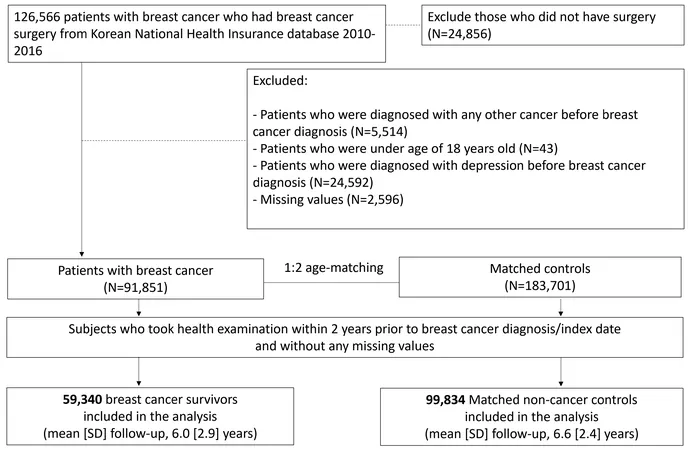
Alarming Rise in Depression Risk for Breast Cancer Survivors: Insights from a Nationwide Study in South Korea
2024-12-27
Author: Ming
Introduction
The mental health of breast cancer survivors is often overshadowed by the physical challenges they face. However, a new study conducted in South Korea reveals an unsettling statistic: these survivors are at a significantly increased risk of developing depression. This comprehensive nationwide cohort study explores not only the incidence of depression among breast cancer survivors but also the critical factors contributing to this mental health crisis.
Study Overview
Conducted using data from the Korean National Health Insurance Service, the study tracked 59,340 women diagnosed with breast cancer who did not have a prior history of depression. These patients underwent surgery between January 1, 2010, and December 31, 2016, and were matched with 99,834 cancer-free individuals by age for comparative analysis. Over an average follow-up of 6.4 years, the research sought to uncover the relationship between breast cancer survivorship and depression risk.
Key Findings
The results were startling: breast cancer survivors had a staggering 39% higher likelihood of developing depression compared to their cancer-free counterparts (sHR 1.39). The risk was especially pronounced in the first year following diagnosis, with younger patients (under 50 years old) facing a risk more than four times greater than those in the control group (sHR 4.51).
Noteworthy is the fact that older survivors exhibited a decreasing trend in depression risk over time. Specifically, after one year, younger survivors still showed a heightened risk, while older survivors leaned towards a more stabilized emotional state, with no significant risk of depression observed after three years.
Another alarming find was the correlation between specific cancer treatments and increased depression risk. Chemotherapeutics like anthracyclines and taxanes, as well as endocrine therapies, were linked to heightened depressive symptoms, especially in older survivors treated with aromatase inhibitors, which contributed to a 41% increase in their depression risk.
What Can Be Done?
Given these findings, it is crucial for healthcare professionals to prioritize mental health screenings for breast cancer survivors, particularly during the first year post-diagnosis. Close monitoring of younger survivors and those undergoing aggressive treatment regimens should be standard practice, ensuring early identification and management of depressive symptoms.
Cultural Context
South Korea's unique cultural backdrop also plays a role in these findings. The stigma surrounding mental health issues may prevent many individuals from seeking help, potentially exacerbating their conditions. Therefore, efforts must be made not only to enhance awareness about depression but also to minimize the stigma associated with mental health care, encouraging survivors to seek necessary support systems.
Conclusion
This groundbreaking study sheds light on the very real psychological struggles faced by breast cancer survivors in South Korea. With younger women particularly vulnerable within the first year of treatment, healthcare systems need to adapt by incorporating comprehensive mental health screenings and supportive resources tailored to the needs of breast cancer survivors. As the fight against both cancer and its repercussions continues, it is critical to ensure that mental health is treated with the same urgency as physical health, fostering a supportive landscape for those on their journey to recovery.
In a world where mental health issues are increasingly recognized as part of the survivorship experience, this study serves as a vital reminder that addressing depression is just as important as treating cancer. Don't ignore the signs; early intervention can save lives.


 Brasil (PT)
Brasil (PT)
 Canada (EN)
Canada (EN)
 Chile (ES)
Chile (ES)
 Česko (CS)
Česko (CS)
 대한민국 (KO)
대한민국 (KO)
 España (ES)
España (ES)
 France (FR)
France (FR)
 Hong Kong (EN)
Hong Kong (EN)
 Italia (IT)
Italia (IT)
 日本 (JA)
日本 (JA)
 Magyarország (HU)
Magyarország (HU)
 Norge (NO)
Norge (NO)
 Polska (PL)
Polska (PL)
 Schweiz (DE)
Schweiz (DE)
 Singapore (EN)
Singapore (EN)
 Sverige (SV)
Sverige (SV)
 Suomi (FI)
Suomi (FI)
 Türkiye (TR)
Türkiye (TR)
 الإمارات العربية المتحدة (AR)
الإمارات العربية المتحدة (AR)